
Green Party membership has surged to over 3000 in Sheffield. What’s driving the increase?
One year ago there were less than 1000 Green Party members in Sheffield, but this month, membership has surpassed 3000.
The social media campaigning from the new leader of the party, Zack Polanski, has been a driving force for some of the new Sheffield members, as the party reached 175,000 members nationally this week.
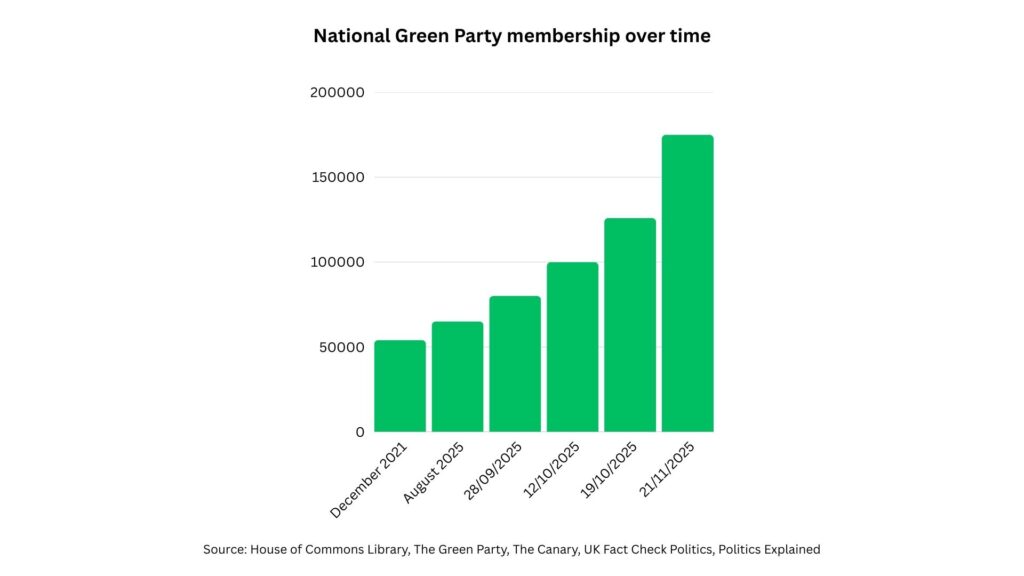
Florence Kilby, 23, lives in Crookes and joined the Green Party last week. She said:
“I've seen a lot of Zack Polanski on social media. The leadership and the direction that he's come with is absolutely amazing. He's very clear on what he wants and what the fundamental values of the Green Party are. That clarity is really important so you know you're standing behind something you believe in.
“Equality, bringing people together, reinvesting into the community, into social causes, making rich people accountable for the massive disparity in wealth. Those things are pertinent in this day and age where there are people who earn £10,000 a day and there are people who can't afford a meal.”
Ms Kilby said she had not come across a political party that she strongly agreed with before, but now she feels she has “a party I can align with”.
Another new Green Party member is a Sheffield-based teacher, and his experiences at secondary school motivated his decision to sign up three weeks ago.
He said: “One thing I found, which has been quite disconcerting, is the prevalence that the right wing parties have with kids between 11 and 18. A lot of what used to be fringe ways of viewing the world have now become quite mainstream. Really quite misogynistic attitudes towards women and their positions and opportunities in life. Some borderline fascist ideologies as well.
“I think the Green Party has been quite successful in disseminating the feeling of optimism and positivity for the future. I think that's something that is way more powerful than negative rhetoric.”
Eamonn Ward, 66, has been a Green Party member in Hillsborough for 25 years and has been monitoring the surge in membership.
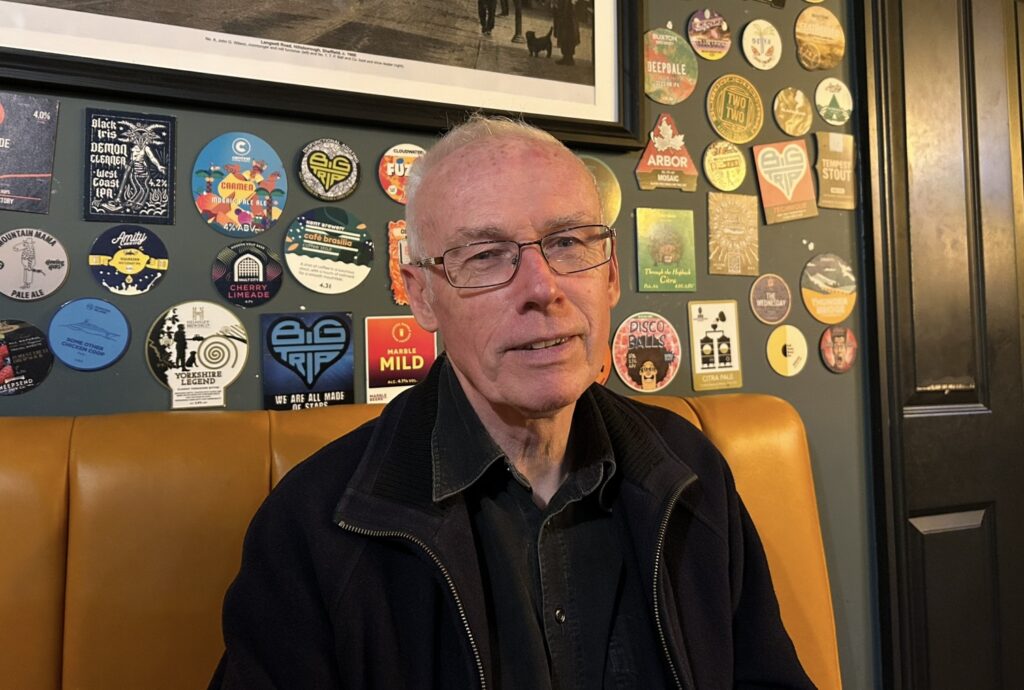
He said: “I've spoken to people on the doorstep who have joined who never heard of the Green Party before, literally never heard of us. Zack Polanski is definitely reaching a different audience, a younger audience, and of course 16-year-olds are going to be voting in the next election."
Mr Ward also pointed to concern for the future as a motivating factor. He said:
“A lot of people are concerned about the future of the country, where the country's headed, seeing the direction influenced by Trump, concerned about what's going on in America, concerned that Reform are heading up the opinion polls. There are people who actively want to do something about that. That seems to be the key.”
Photo courtesy of Eamonn Ward.

Sheffield community reacts to gambling tax rise
Chancellor Rachel Reeves has announced that £1.1bn pounds will be gained from new taxation on the gambling industry, with some levies being increased by almost double.
As part of the new initiative, bookmakers will have to pay significantly more tax in areas such as online betting games, with an increase to 40% in remote gaming duty (otherwise known as online betting games) compared to the previous 21%.
Online gaming in particularly was reported as generating £5bn in gross gambling yield according to a recent report from the gambling commission on Tuesday, with remote gaming in general generating £7.8bn.
In response to the tax changes, Evoke, who own betting companies such as William Hill (a company which has a significant presence in Sheffield), commented: “The Board believes that industry tax changes will result in thousands of industry-wide job losses and increase customer activity on the unregulated black-market, ultimately reducing the overall monetary amount of tax the gambling industry pays in the UK.”
However, the change was also welcomed by some, such as the Chair of the Treasury Select Committee, Dame Meg Hillier, who stated in a government press release: “The Chancellor has made the right decision in agreeing with my Committee that the tax rate for remote betting, including highly addictive casino games, should reflect the harm it inflicts.
“Some parts of the gambling industry, such as racecourses and bingo halls, make a cultural contribution to our country. This is not the case, though, for online slots and other remote gaming which can quickly drain the bank balances of vulnerable people after just a few clicks of a button on a phone.
The mention of gambling addiction is of particular interest, especially after recent statistics from the gambling commission revealed that young people were particularly vulnerable to online betting games and other gambling. The commission reports that 22% of young people surveyed were at serious risk of a gambling problem, with a further 1.2% being classified as having a gambling problem.
It remains to be seen whether this tax change will have a positive or negative impact on the local betting community, and with the possibility of larger companies closing some of their stores due to cost. It is possible that the betting landscape in Sheffield may change, particularly with William Hill’s prevalence in the area.

Sheffield residents dismiss Labour’s Autumn Budget as “damp squib”
After months of speculation and plenty of pitch-rolling, the Chancellor finally took to her feet in Parliament on Wednesday to announce the government’s Autumn Budget.
Rachel Reeves has been working to produce a strategy that would be able to satisfy the OBR’s stipulations, without raising income tax.
As a result, much of this year’s Budget was plagued by mishaps, u-turns, and empty promises, leaving members of the public unsure as to what it had actually achieved.
One Sheffield resident said: “It was a bit of a damp squib really, wasn’t it?
“No one’s really going to benefit from it.”
Many have put this down to an absence of courage amongst Labour politicians, particularly surrounding the introduction of an effective wealth tax.
Another local resident said: “We’re just in a slow decline.
“Labour are scared to tax capital and the Green party are obviously gaining more attention because of that.”
Perhaps the biggest change to public spending was the Chancellor’s decision to scrap the two-child benefit cap, which had originally been imposed by the Conservative government back in 2017.
This particular development has enjoyed a strikingly positive response from Labour backbenchers, helping to strengthen Keir Starmer’s leadership after a shaky few weeks.
Another member of the public, who is local to Sheffield, agreed: “People are struggling.
“There’s some pockets of entrenched poverty in Sheffield where it’ll definitely help.”

Breaking with the mainstream narrative, Jesse Matheson, Professor of Economics at the University of Sheffield offered a comparably sympathetic analysis of Reeves’ performance.
While he agreed that this was not a ground-breaking Budget, by any means, he was quick to credit the Chancellor with having done the best that she could, despite a challenging set of circumstances.
Professor Matheson said: “I think it’s turned out as well as it possibly could have for Rachel Reeves.
“I was actually really impressed with how well it was handled politically because this was a really tough Budget.”

Sheffield pop-punk act marks two-year anniversary with “most excited” tracks to date
Up-and-coming Sheffield band have released two new tracks as part of two-year anniversary EP.
Sheffield-based pop-punk group X2 Fast, or Times Too Fast, has unveiled their latest singles 'For The Better' and 'There's a Last Time for Everything' today, adding to 'Settle Down' as part of their third EP.
Guitarist Simon Fairbanks said while both songs are about growth and moving on from darker places and things, they are different in sound and from what their fans are used to listen to.
Mr Fairbanks said: "There's a Last Time for Everything has got a bit of a heavier track, so it's got some screamy bits and is explosive all the way through. It's about not letting people hold you back and just doing what you want to do even if people tell you not to.
"And then For The Better is a bit softer but still pop punky with high-energy choruses. It is about improving and building yourself up."
The feel-good energy in their music is reflective of every member's collaborative spirit and 'no ego' working style.
Guitarist Harry Kilmartin said: "It's probably one of the tracks I've been most excited for.
"It's not just one or maybe two people driving the entire thing. As a band we're quite collaborative with the rest of the song writing process around the sound of the song and the structure of the tracks."
Being friends outside of music helps build their chemistry. They hang out regularly and share each other's hobbies, like star gazing.
All of X2 Fast's content and materials are produced locally in Sheffield, including these new releases. All band members live in and around Sheffield.
They record their music at Steel City Studios and film their videos around the area. Even their merchandise is produced by a Sheffield-based artist.

X2 Fast will have their first-ever UK tour in December.
They will start in Nottingham on December 11th, headline in Sheffield on December 12th before playing in Manchester and London on the 13th and 14th.
Mr Kilmartin said: "Four nights in a row. So that's going to be really exciting. I think that's going to be an interesting way to kind of test the water with it because, fingers crossed, if all things go well, we're going to be playing a lot more like that and we're going to be doing a lot more."
Bass guitarist George Kladakis added: Playing new cities is great, obviously gigging with new bands, but then bringing audience in and always getting to open up and obviously new tracks, play new songs. It's always exciting."
Listen to X2 Fast newest tracks on Spotify.
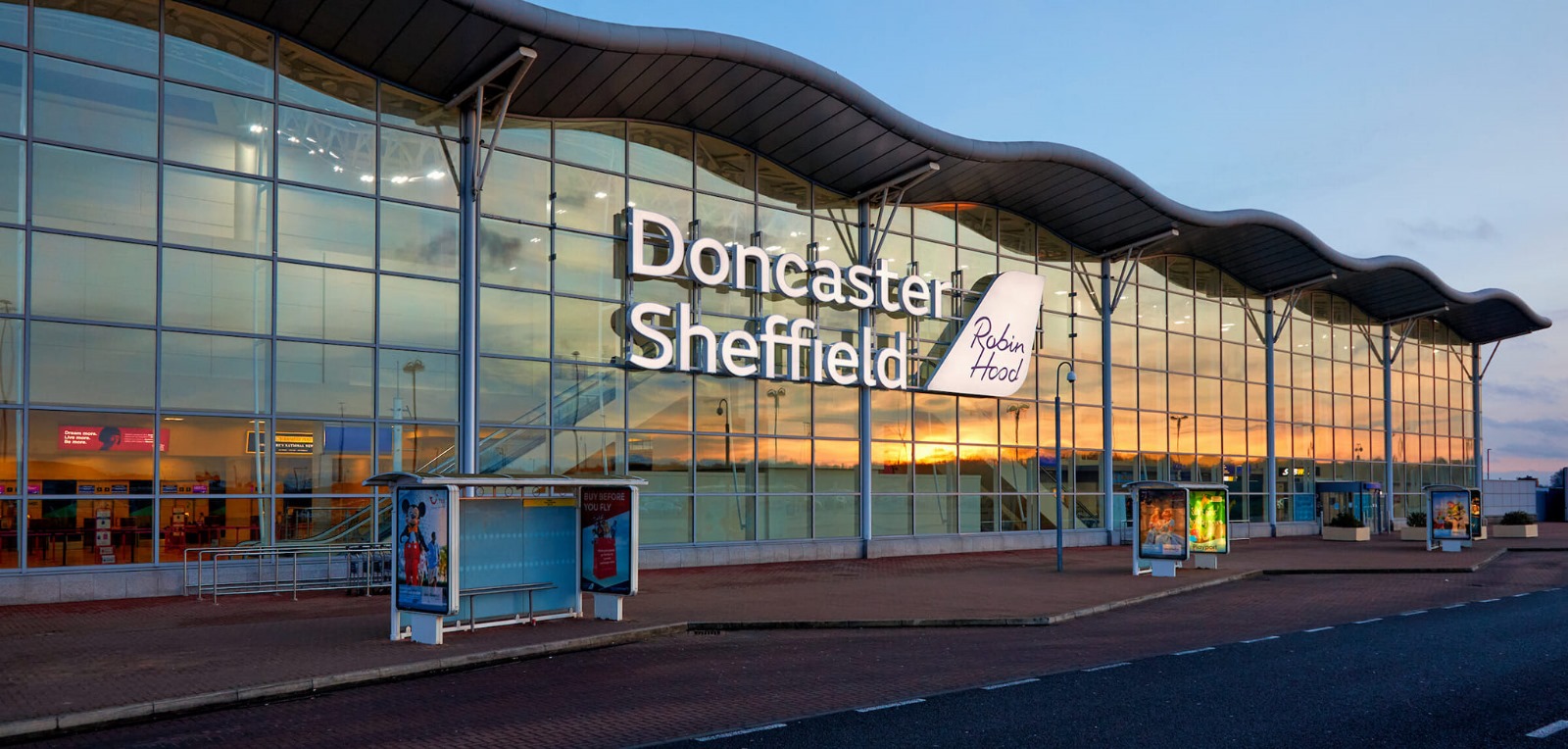
Doncaster Sheffield Airport reopening explained: Is the airport ready to “fly and take off?”
"Quickest Reopening Ever?"
In 2022, flights from Doncaster Sheffield Airport ground to a halt. South Yorkshire lost its only regional airport, thousands of jobs were affected and passengers have been forced to fly from airports such as Manchester, Leeds and London to reach their dream holiday destinations.
Three years on, the region’s holidaymakers are one step closer to being able to jet off abroad from an airport on their doorstep.
City of Doncaster’s full council meeting on Thursday 27 November saw councillors of all political stripes in a cross-party agreement overwhelmingly approve a £57m loan towards running costs, 42 out of 51 councillors voting yes to carry the motion.
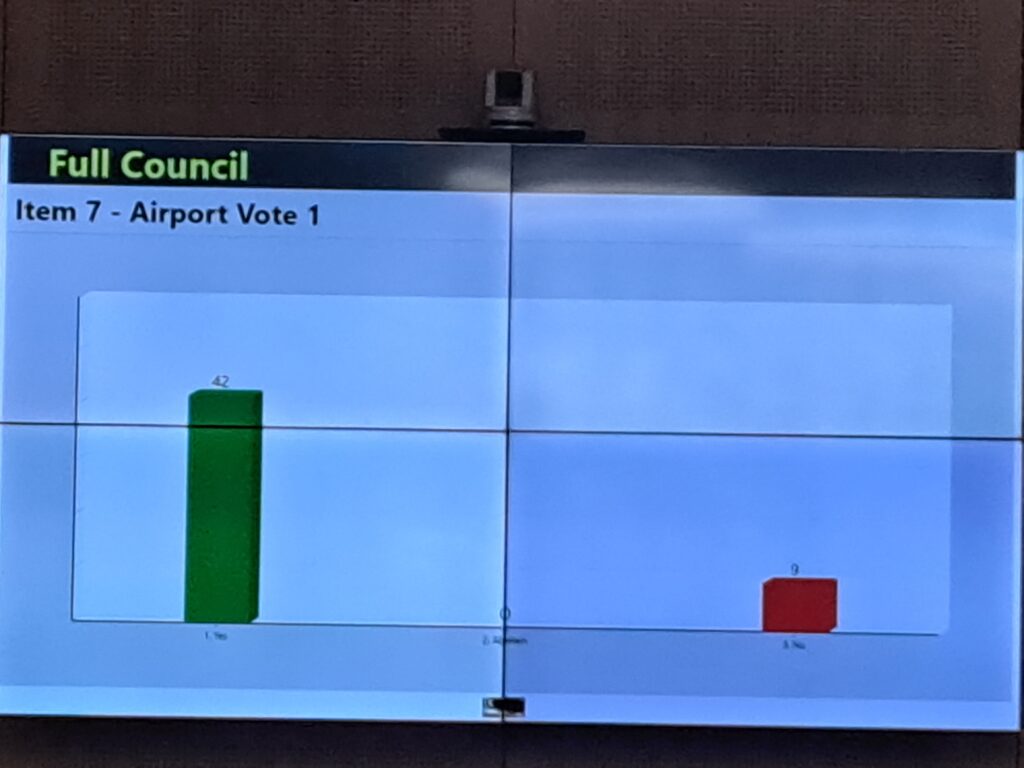
The results of the vote
Following a campaign heralded by South Yorkshire politicians Ros Jones and Oliver Coppard, City of Doncaster Council’s approval of the borrowing is a “critical turning point” in securing the airport’s future.
The reopening of the airport is the centre of the wider South Yorkshire Airport City Plan, a ten year programme which aims to develop a sustainable aviation hub to boost economic growth.
Ros Jones, Labour Mayor of Doncaster, said the reopening of Doncaster Sheffield Airport is “vital for future prosperity” and will create “unrivalled economic opportunities.”
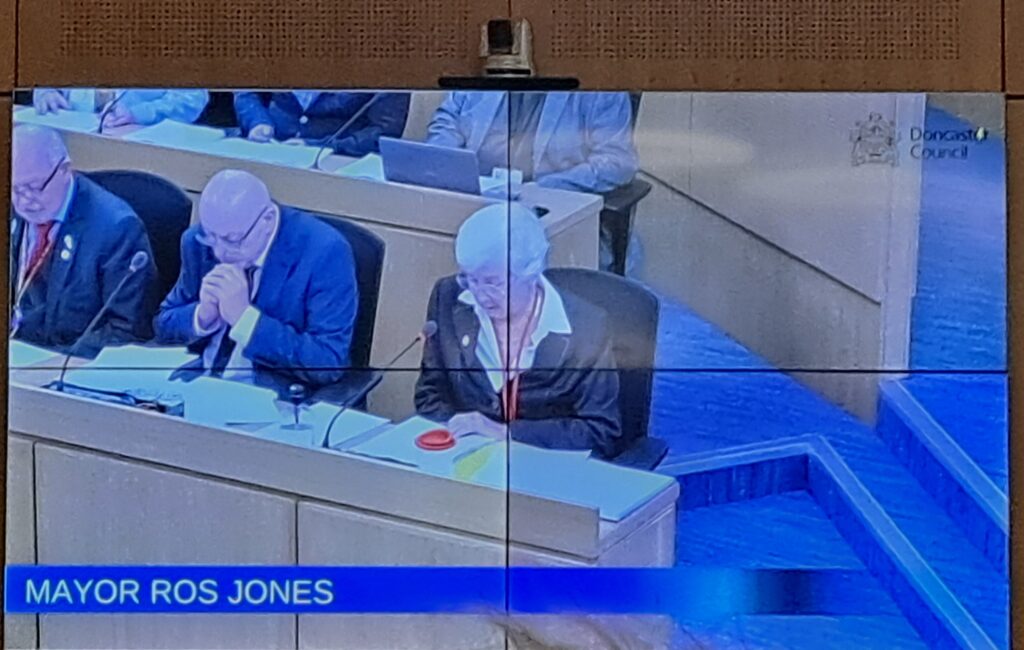
Mayor Ros Jones addressing the council chamber
Similarly, Guy Aston, Reform UK Group Leader, said the airport is a “gateway to opportunity and a symbol of regional pride.”
While Jones and Aston are committed to “standing together for South Yorkshire and Doncaster” and “delivering for the people” they serve, with the total costs running up to just over £193m, critics of the project have questioned the council’s massive financial undertaking.
Jane Cox, Conservatives Councillor for Finningley, said the vote on the borrowing was the most "toxic" she had ever been involved in and Rachel Reed, Reform UK Councillor for Conisbrough , accused council leaders of a lack of transparency around proceedings.
With the airport due to run at a loss for the first nine years of its operation according to council reports and climate activists condemning the project as "damaging", the journey towards “lift off” has been complex and controversial.
Why did Doncaster Sheffield Airport close down?
First opened in 2005 on the former RAF Finningley base, Doncaster Sheffield Airport ran services across Europe and the globe including Spain, Greece and Turkey. The travel hub was once home to flagship budget airlines Wizz Air, Flybe and TUI and in
In October 2022, Peel Group, the owners of Doncaster Sheffield Airport, announced the closure of the site due to a lack of financial viability. The group cited the high operating costs, the impact of the COVID 19 Pandemic and revenue as factors behind their decision.
Following Flybe's withdrawal in 2019 and WizzAir's transferral to Leeds Bradford, TUI was the sole remaining operator by the airport’s closure.
Despite efforts from the mayors to encourage Peel to seek alternative investors and a judicial review, Peel Group phased out flights shut down services and phased out flights.
Who is running the airport now?
City of Doncaster Council established a subsidiary company FlyDoncaster which will be responsible for managing and running the airport alongside German company Munich Airport International who will support the operation.
Criticism has been levelled at the "conflict of interest" with key City of Doncaster Council executives on the board of FlyDoncaster. Mayor Ros Jones has promised there has been "total transparency" in all stages of the process.
Where are the funds for the airport coming from?
South Yorkshire Combined Mayoral Authority is giving £160m to the City of Doncaster Council towards the reopening of the airport.
This will be paid in annual £6 million instalments from City of Doncaster Council to FlyDoncaster.
The £57m loan agreed by City of Doncaster Council is intended to assist with immediate cash flow to accelerate the reopening process. It has not been taken out because of a shortfall in funds.
Is the public in favour of the plans?
The Save Doncaster Sheffield Airport (DSA) campaign led by local garage owner Mark Chadwick launched a public petition which received 130,000 signatures.
During November 2025, City of Doncaster Council launched an online public consultation form which as to date of publication has has had over 8,700 respondents and 93% have said they are in support of the reopening of the airport.
Sheffield Wire spoke to some locals and they gave us their thoughts:
What is Gateway East?
Gateway East is a multi-purpose site which houses Doncaster Sheffield Airport.
The site is part of a wider manufacturing, leisure and residential development which intends to create a sustainable, multi-use hub and drive economic growth. The masterplan includes a plaza, a commercial Innovation Quarter and 1200 residential homes.
Environmental Implications:
The environmental impact of the reopening of the airport has been strongly criticised by local climate groups.
Council reports stated "Re-opening DSA is also likely to reduce the number of journeys from the region to other airports therefore reducing associated emissions. It is the intention of FlyDoncaster Ltd in partnership with Munich Airport International to undertake an environmental assessment to ensure we maximise every opportunity to be a green city airport."
Chris Broome, campaigner for South Yorkshire Climate Alliance, does not think this will be enough. He said: "What the council and the air authorities stress is that they are going to have renewable energy at the airport, they're going to have a rail line, improve the bus services, carbon zero buildings.
That will affect 2% of emissions, 98% will be from the flights themselves.
It's completely inadequate by a huge margin."
When will I be able to fly from Doncaster Sheffield Airport?
Freight flights for business and commercial uses are due to commence in 2027.
Commercial flights for passengers are expected to resume in summer 2028.
What’s next for Doncaster Sheffield Airport?
The council continue to seek a private investor who can support the reopening project who the council have a "significant confidence of success" in.
A fully functioning airport for South Yorkshire is now one step closer to being reality thanks to the approval of Doncaster council funding.

Church to offer free Christmas dinners in community led initiative
A church will be hosting free Christmas dinners next month in addition to their free weekly meals.
St Swithun Church is part of the Sheffield Manor Parish, a large inner city parish in the south-east of Sheffield, with a "heart in the community." They host free meals every Thursday.
Their Christmas dinner will be held on 18 December.
Sarah Short, is a church goer and a Manor Parish community kitchen volunteer, she said: "My role is just to be around and offer food for people and community that might not get it out there.
"We are expecting around 100 people."
According to Ms Short these dinners are not simply about the food. They are about forming a community.
She said: "There's quite a few people that come in regularly, it's their night out. Once a week, coming in and talking to other people.
"I think that as a community we all come together. Sharing a meal is great, but chatting and finding out about other people is just as important."
The scheme is called 'pay as you feel' an initiative that allows St Swithun's community to chip in in any way they can. The church is also partnered with the S2 community food bank, ensuring that any surplus of food will not be wasted.
The church is looking to expand their community in the future, by partnering with other local churches and libraries to create other community kitchens, as well as expand into other areas of Sheffield. Ms Short also hopes to be able to offer free dinners for other holidays such as Easter.
Ms Short said: "Manor Parish Community Church is a faith-led initiative but with a heart in the community, aiming to get people together to share a meal."

Gin and Rum Festival proves a hit in Sheffield once again
The largest touring Gin and Rum festival held its final date of the year in Sheffield last weekend.
Gin and Rum festival showcased over 120 brands of gin, rum, and tequila at the Trafalgar Warehouse , the annual final stop on its national tour.
Donna Brady, events director at Gin and Rum festival said that they always "sell out with ease" at the Sheffield stop of the tour.
Ms Brady also talked about how coming back to the Trafalgar was also important to the festival, despite it being one of the smallest venues on the tour, even then still selling 1,400 tickets for the two session event.
"They helped us out in the beginning, so we like to help them out now."
The festival is now in its seventh year and Ms Brady said that they have seen the change not only in their own growth but also in Sheffield itself.
"When we first came here there was nothing really around. And we arrived today and were like wow where did this come from."
The festival sees many people returning every year, with organisers saying they saw "many familiar faces" and one couple saying this was their fifth year attending.

The festival brings together national and international distilleries and brands as well as it's sister brand Soul Rum.
Dan Walsh, an independent distiller, travels with the festival endorsing his own and other independent distilleries that the festival supports, such as Robin of Loxley, a Yorkshire independent distillery that sent several of their gins to the festival.
Mr Walsh's own brand, Rascal Gin, focuses on fruit flavoured gins that still maintain the characteristic dryness of a classic gin.
When discussing the current gin market, Mr Walsh said that "people crave authenticity" and that doing something with the fruit flavours is the key to standing out.
The festival is already booked in for a 2026 edition at the Trafalgar Warehouse to again end the festival season. Tickets are on sale and can be found at Festival Tickets - Gin & Rum Festival Gin & Rum Festival.

“No game is easy” says Hatters star ahead of big fixture
The B.Braun Sheffield Hatters face Manchester Basketball tomorrow evening, and will be looking for a reaction following last weeks loss against the Caledonia Gladiators.
The Hatters currently sit second in the championship, and will be keen for a victory to close in on top spot.
Sheffield Wire Reporter Max Carson spoke to head coach Vanessa Ellis and star player Megan Mullins, who were adamant about the side's desire for victory.
Ms Ellis said: "In our league we have to come out and play 40 minutes to win, it's just about trying to improve."
The Hatter's were last year's play off champions, defeating Oakland Wolves at London's 02 arena in May.
Despite the Hatter's success, Ms Ellis has been vocal about the struggle women's basketball faces, calling out issues in infrastructure and funding.
After Covid, the Hatters had to sit out an entire season due to lack of financial support.
Despite the off-court struggles, she said: "We just have to do our bit, and ignore what's happening when we're on the court."
The Hatter's have a proud history, they were the first women's basketball team to be established in the country, and are making significant efforts to maintain their dominance of the sport.
This year the team have six new arrivals, including power forward Megan (Mo) Mullins, who averaged 16.3 points for the Launceston Tornadoes in Australia last year.
Ms Ellis spoke more on her contribution to the team:
Ms Mullins said she'd found the new league "fun really aggressive and really physical."
She has basketball experience across the globe but said she appreciated the lack of language barrier in Sheffield although "the accent is a little bit thick."
Both Ms Ellis and Ms Mullins spoke on the importance of team chemistry, especially with a continually changing team.
Ms Mullins said: "It's not always going to gel, most important is that there's trust with each other, respect with each other and we do what's best for the team."
Manchester Basketball will prove no easy opponent on Saturday evening.
The side's star player Georgia Anderson recently became the leagues all time top scorer, with 2435 points over the last decade, and she will be keen to add to her tally.
Ms Mullins said: "No game is easy, but nobody beats us, we only beat ourselves."
The tip off is at 7:00 pm on Saturday, at the Canon Medical Arena.
Picture Credit - Sheffield Hatters Basketball Club
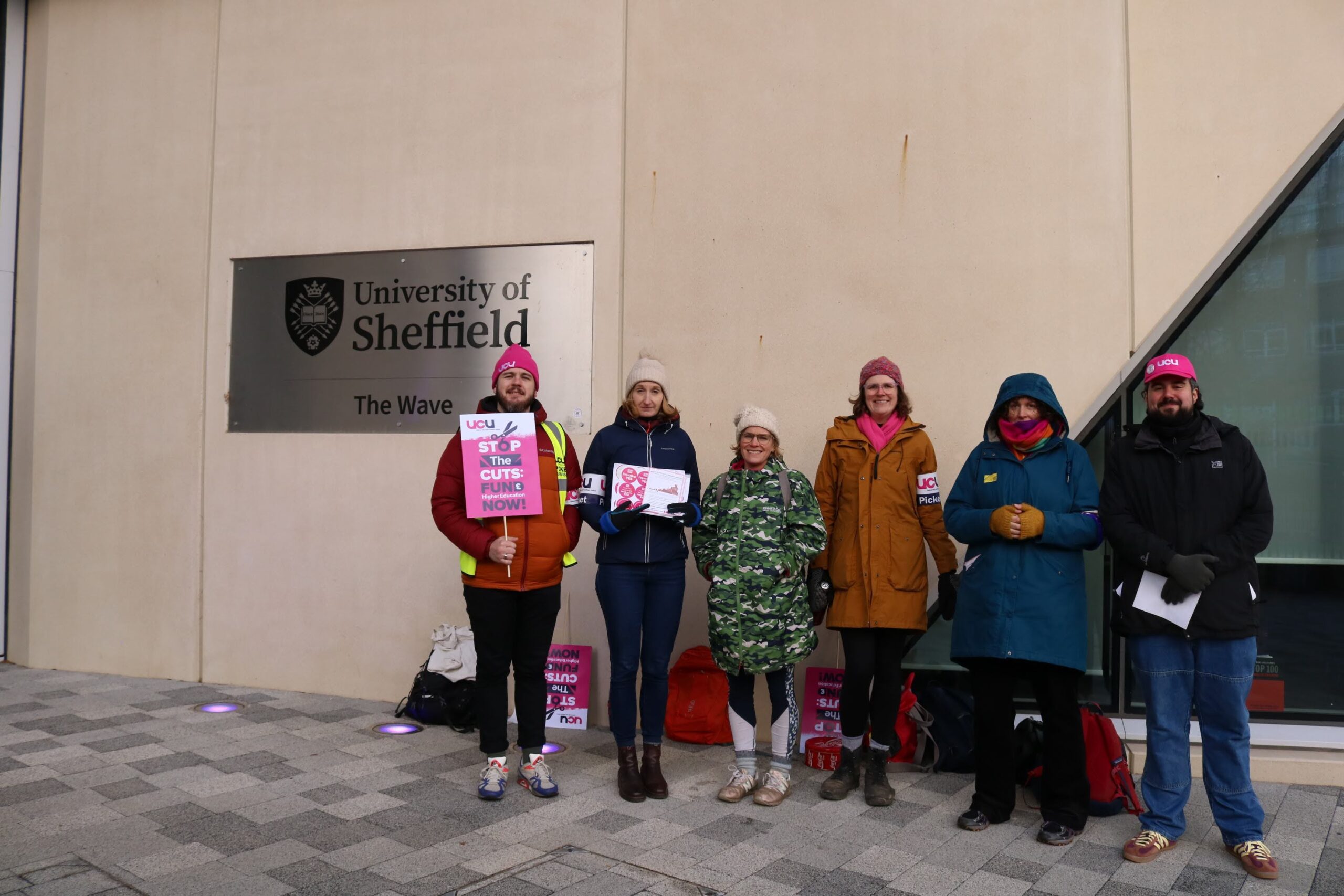
UCU strikes: The latest updates
Staff at both Sheffield universities have reached the mid-point of their proposed 28 days of strike action today, and find themselves in very different situations.
The strikes, organised by the University and College Union (UCU), were set to take place over four weeks, beginning the week commencing 10 November for Sheffield Hallam University, and the week commencing 17 November for the University of Sheffield.
At both universities, staff have decided to take action against cost-cutting measures by university management, which may put staff at risk of redundancy.
UCU general secretary Jo Grady said in a press release: "There is no justification for compulsory redundancies at the University of Sheffield or Sheffield Hallam, especially when there are other options available."
Despite staff at the University of Sheffield being subjected to voluntary, rather than compulsory, redundancies, those at risk are concerned about what the future holds.
Dr Liam Stanley, a senior lecturer at the School of Sociological Studies, Politics, and International Relations, is participating in the strikes. He described a general atmosphere of anxiety amongst staff and raised concerns about his own job security.
He said: "I’ve got young children, I’ve got a mortgage, so the potential of losing my livelihood is an incredibly big deal."

The University of Sheffield had previously made an offer to commit to there being no compulsory redundancies before 31 October 2026, and an additional pause on all new restructures until April 2026. This offer was declined by UCU, and has since been withdrawn following the eight days of strike action experienced over the past 2 weeks.
A spokesperson from the University said: "We have been clear that to reach any agreement we must avoid further disruption to our students as a result of ongoing industrial action of any kind."
Elsewhere in the city, management at Sheffield Hallam University has refused to rule out compulsory redundancies, despite having already removed 500 jobs last year, and a further 170 since May 2025.
However, Hallam's branch of the UCU is involved in negotiations regarding an offer that was put to them by the university earlier this week.
Professor Tom Smith, Communications Officer for the UCU branch, feels confident that there have been some positive aspects to the offer, although the details of these cannot be revealed until the outcome is certain.
Strike action planned for Monday 1 to Friday 5 December at Sheffield Hallam University has been called off. But for many students, especially those with additional external factors impacting their learning, the damage has already been done.
Georgia Roberts, a psychology and criminology student at Sheffield Hallam, has experienced stress as a result of strike action happening at the same time as assignments are due.
She said: "There is still support available, but it's not face-to-face, which, as a student with autism, I feel like I need more."
Similarly, Camilla Prida, a senior university teacher at the University of Sheffield, is concerned that her students from widening participation backgrounds aren't getting the support they need to cope with her absence during strikes.
"My stress levels are through the roof. I hope students realise this isn't a decision I've taken lightly," she said.
Despite the negative impacts it can have, disruption to the student experience is the "only way" to get the university's attention, says University of Sheffield striker, Amy Shaw.
It seems that finding this balance between student welfare and maximum impact is an issue to consider if strikes continue.
Image Credits: Christopher Thomas
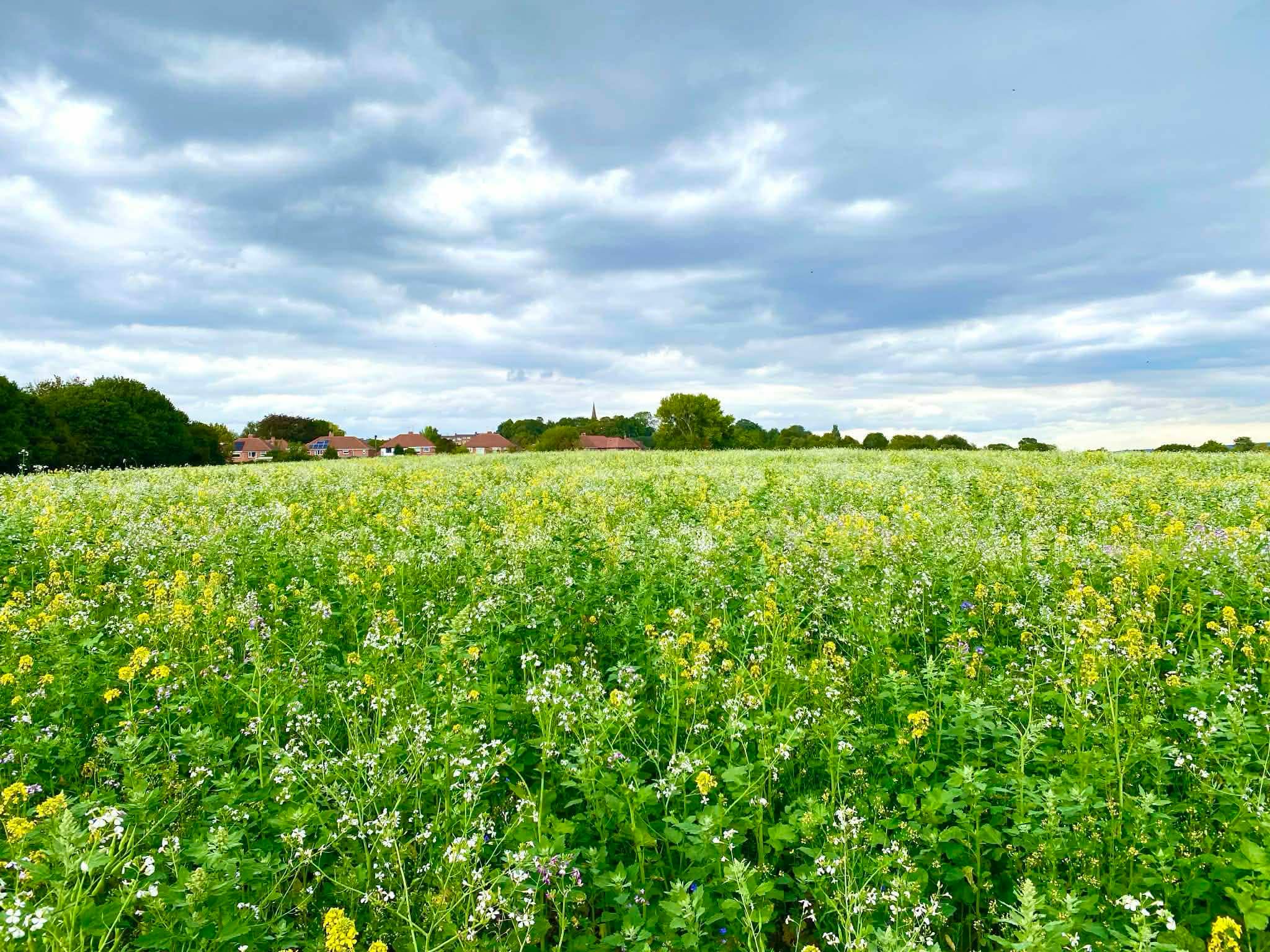
“There will be a big fight”: How Handsworth residents are battling the council to keep their greenbelt land

Mother of young girl “will never forgive” the health services whose crucial failings led to her death
An inquest jury has found inadequate testing at the Queen's Medical Centre (QMC) in Nottingham "possibly contributed" to the death by suicide of 12-year-old Mia Hayes.
Chloe Hayes, the mother of Mia, said: "I will never forgive the QMC or the Becton Centre for failing her."
The failure to undertake a brain scan or further testing at QMC before her transfer to the Becton Centre in Sheffield "possibly contributed" to her death according to the jury's verdict.
Mia was suffering from undiagnosed autoimmune encephalitis, which may have contributed to the behaviours she was demonstrating.
This diagnosis was revealed through a post-mortem examination four and a half days through the inquest, provoking gasps of shock in the courtroom and tears among family in the public gallery.
Mrs Hayes said: "The past two weeks have been unbearable sitting and listening to how badly Mia was let down."
Amy Rossall, a specialist in medical negligence at Hudgell Solicitors, is representing the family and said: "When the family needed specialist healthcare support, it failed. We will continue to support Chloe in seeking full justice and accountability."
Chloe Hayes said she believes the doctors at QMC simply passed Mia onto mental health services as quickly as possible, without adequate testing, which led to her transfer to the Becton Centre.
Dr Manjeet Shehmar, medical director at Nottingham University Hospitals Trust, said: "While this is an incredibly rare condition and initial tests were negative, we recognise that further testing may have had an impact on her future, for which we are truly sorry."
Mia Hayes began to behave unusually over Christmas 2023, hearing voices telling her she needed to go to heaven or something bad would happen, and attacking her mother.
She was found to be suffering an acute psychotic episode and was sectioned under the Mental Health Act.
She was then transferred to the Becton centre where she was found unresponsive in her room on 29 January 2024.
Mrs Hayes believes "Her mental health spiralled further out of control there" and "The many failings and lack of care meant sadly she wasn't properly protected from harming herself."
She said: "For 12 years Mia was a beautiful soul who loved life and loved her family, and that’s how we want her to be remembered”.

Mia's extreme behaviour was only evident in the final weeks of her life and her mother maintains that she "Never believed for a moment that Mia wanted to take her own life."
Dr Jeff Perring, executive director at Sheffield Children's NHS Foundation Trust, of which the Becton Centre was a part, said: "We are deeply sorry for Mia's death and recognise the profound impact this has had on those who loved her."
Anyone struggling with mental health issues can contact the Samaritans at 116 123.

“Amateurish” England to send reserve team this weekend ahead of second Test
England have opted against playing a two-day pink ball game against the Prime Minister’s XI this weekend in preparation for the second Ashes Test in Brisbane.
Instead, England will send their reserve team ‘The Lions’ to play against the Canberra team made up of promising young cricketers from around the region.
Ben Stokes said England would not change their preparation plans just because the first test ended inside two days, adding that he thinks comparisons to previous Ashes tours are unfair.
He said: “That’s how it was done a long time ago, we prepare incredibly well and work incredibly hard and that’s what we’ll keep on doing because if the results don’t go in our favour, we’re not going to change that”.
The move has surprised some pundits, who particularly thought getting some time in the middle would be invaluable for the England batters given their woes in Perth.
Former England Captain Michael Vaughan is adamant they should play in the Prime Minister’s tour match.
He said: “It’s amateurish if they don’t go and play, what harm is playing two days of cricket with a pink ball under lights, when you’re preparing for a pink ball Test Match.
"My method would be you’ve got a pink ball two day game go and grab it and give yourself the best chance.”
England’s preparation before the First Test came under fire as they played only one tour match against their own Lions team at Lilac Hill, turning down the option of playing against Australian state sides.
Australia have a strong record with the pink ball, winning 13 out of the 14 tests they have played, whereas England have won two of the seven they have played.
The first ever day-night Ashes Test was in Adelaide in 2017, with Australia winning by 120 runs.
Day-night cricket is popular amongst some fans as it allows people to come in and enjoy the cricket after work and makes the most of long summer evenings.
However critics say it gives the seam bowlers excessive amounts of lateral movement, particularly when the lights come on.
The second test at The Gabba in Brisbane starts on Thursday. Australia will be without captain and fast bowler Pat Cummins who is still recovering from a back injury.
